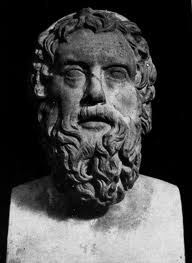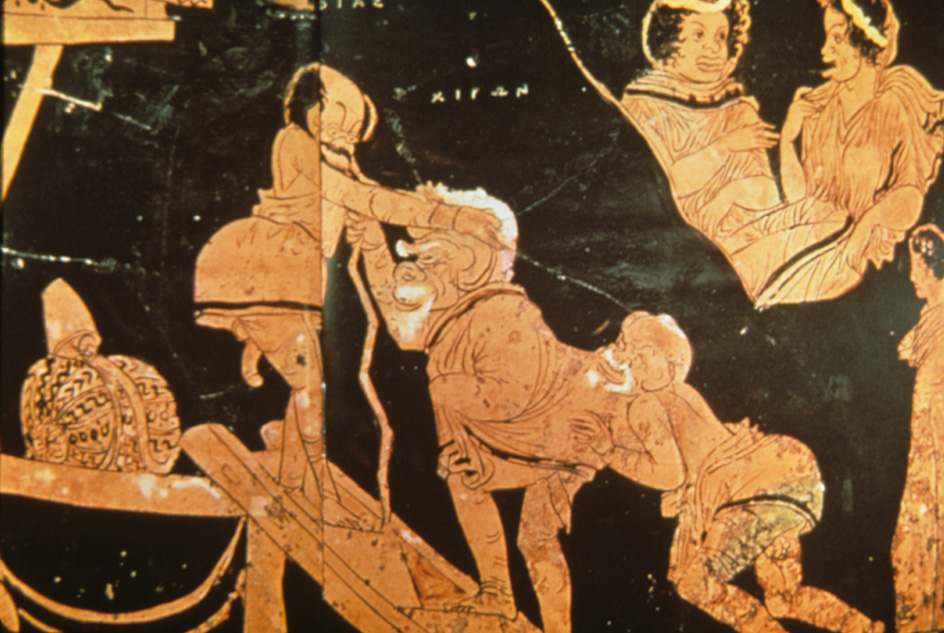By Ben Potter
To translate Ancient texts correctly is no easy task, even for the most proficient student of Greek. To attempt it at all is commendable, but to do so when the subject matter is a comedy, is a project fit for only the insanely brilliant or the brilliantly insane.
Translation from a dead language, with all its subtleties, nuances and ambiguities, is made all the more difficult when one hopes to round off a day with more than merely a sense of accuracy, but with that most elusive and intangible of things… a sense of humour.
Although there is no short supply of ancient comedy, there is one writer who shines above all the rest. One who was not only the most famous in his own time, but has stood the test of ours: Aristophanes of Athens.

In addition to being the undisputed master of all ancient mirth-making, Aristophanes (b. 445 BC) is, in fact, the only extant example we have of Old or ‘Attic’ Comedy. Indeed, he is the only individual antiquity produced about whom we can use the over-flaunted term ‘comic genius’.
Not everyone, however, agreed with this synopsis.
Within 100 years of their inception, the plays Aristophanes wrote, produced and directed at the theatrical festivals of Athens were considered to be crude and dated. At least by the likes of Aristotle.
And there can be no denying that boorishness, lubricity, slapstick, innuendo and scatological humour feature throughout the Aristophanic canon.
However, this ‘low’ humour is complemented by political satire and parody, witty one-liners, puns of all calibre, surrealism and farce.
This juxtaposition of the lofty and the base was perhaps essential for Aristophanes’ audiences, who made up a (10,000 person strong) microcosm of Athenian democratic life, from the illiterate market trader to the most learned aristocrat.
About Aristophanes himself we know almost nothing, save what we can infer from his own texts and from Plato’s Symposium, in which he features as a character.

In this work, Plato portrays other notable Athenians (e.g. Agathon, Alcibiades and Socrates) with enough accuracy to add verisimilitude to the whole piece. Thus we assume that the Platonic character of Aristophanes correlates, at least in part, to his flesh and blood model.
Plato presents the comedian as convivial, popular, creative and intelligent, while Socrates states that his “whole concern is with Dionysus and Aphrodite”. Although Dionysus was the god of both wine and theatre, in the context of The Symposium it is easy to imagine that Socrates is accusing him of being a drunken womaniser.
This is reinforced at the end of the text, when everyone has fallen asleep except Socrates, Agathon and Aristophanes, who are still drinking as the sun rises.

Aristophanes was also renowned as one who took politicians to task for their avarice and incompetence. The fact that he lived through the Peloponnesian War meant that he had no shortage of opportunity to do so.
In this respect, the law was complicit with the artist, as there was no legal recourse for a citizen who believed himself defamed in a comedy. Blasphemy and treason, however, were dealt with severely. Aristophanes found this out first-hand during the trial, which followed his less-than-patriotic play The Babylonians, in 426 BC.
The fact that he was never tried for impiety gives us a good deal of knowledge about what was generally considered acceptable.
For example, in The Frogs, he portrays Dionysus as lazy, cowardly and generally useless… during a festival held in the god’s honour!
Much like the eclectic Athenian audience then, a modern reader gets more from Aristophanes’ comedies with a greater knowledge of Greek history and culture. That said, it would be boggling to imagine anybody would have to plod through the text, laboriously wrenching the jokes from the page.
This is because some of the plots alone are enough to raise a smile, e.g. women of the city taking over the government, the gods being held to ransom, all wives of warring Greeks going on a sex strike, etc.
Just try not to laugh.
As ever, there is another who can put it far more eloquently than I. Scholar and translator, David Barrett:
“Reading Aristophanes we fall under the spell of this illusion [of personal participation]: we sit among his audience, indistinguishable from the rest; we laugh when they laugh, are moved when they are moved, hardly conscious that we sometimes have no idea what it is all about.”










One comment
Ancient Greek is not a ‘dead’ language. If language was simply a mean of communication, I think that there wouldn’t be a problem. It happens though to be a magic tool and a bearer of moral values. A language is acquired through the passing of the years with certain moral values. And these moral values require some obligations. The great tradition of the greek poetry bears the burden of the unstoppable preservation of the language through all the ancient years till now.
Sincerely,
Alexandros Ts.
Trackbacks
Our apologies, you must be logged in to post a comment.